Chitwan National Park Nepal:
In a Tree House at Night with Rhino.
January 27, 2024
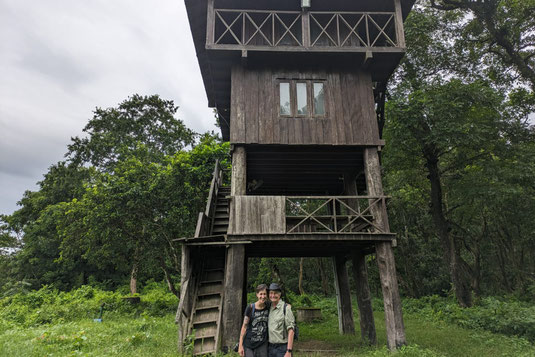
"…and we can also spend a few days in the jungle while we’re in Nepal," says my boyfriend.
Huh? Jungle in the Himalayas? In my mind's eye, I see a giraffe wearing snowshoes and dancing on Everest.
After a bit of research, I realize that despite many years of travel, I've once again walked right into yet another country cliché. Shame on me, as I am one who always laughs when Americans think all of Germany is like Bavaria.
Nepal has much more than just eight-thousanders (mountain peaks over 26,200 feet high) and Himalayan trekking, it also has an area of subtropical climate, complete with monsoons—where summer temperatures can reach as high as 110 degrees. Sir Edmund's ice axe would melt out of his hand.
Chitwan National Park is in this climate zone. And who lives there? Rhinos, monkeys, crocodiles,
and tigers! So, let's go there!
My boyfriend suggests that we stay overnight in a tower located in the middle of the jungle, I'm excited! We had previously spent five days in the Ecuadorian rainforest, and I love being close to, and in, nature.
Luckily for me, all memories of the horrendous heat, humidity, and bugs have been erased from my mind—and so we happily take our lives in our hands and ride in a tourist bus from Kathmandu, Nepal's capital, to Chitwan National Park, a six-hour drive away. We arrive to find hungry, grinning crocodiles, nocturnal rhinos, and the surprisingly large and positive impact that we as tourists can make with the smallest of our decisions.
Sunset at the jungle river
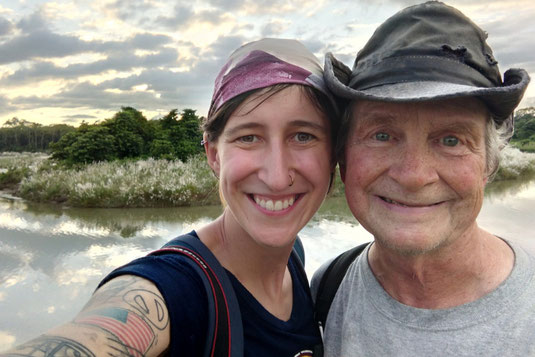
Dramatic, purple clouds dotted with glowing orange spots move leisurely above the wide,
meandering river that flows through the jungle. During our first evening in Chitwan National Park, we sit on the banks of the Rapti River and watch the sunset. While I try to
take a photo of a heron, a group of tourists from China tries to take photos of us. I think about frantically throwing some of my business cards at them and claiming to be Queen
Squirreletta of Saxony-Anhalt.
But then we simply walk through stunning fields of green rice beautifully lit by the fading evening light, back to our bungalow—unrecognized by anyone.
For three days, we stay in the Safari Adventure Lodge, where we enjoy fantastic Nepalese food and a small common garden area filled with butterflies, pavilions, and huts. At one point, I see an amazingly long snake and almost stumble over a green frog in front of the entrance to the lodge. "This means good luck!" says one of the employees exuberantly. A lucky frog, I like that!
Of tigers and grinning crocodiles
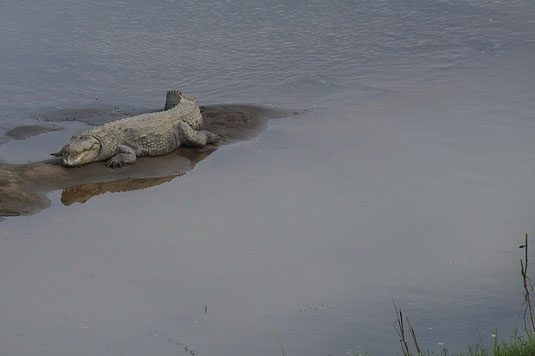
The national park begins right across the road from the lodge but we are separated from the jungle by a high wall topped with barbed wire. Huh?
Chitwan National Park is 360 square miles in size and the animals can roam freely within it. "But if we hadn't built a wall between the park and the compound, the tigers would come at night," explains one of the guides. “That would be dangerous for the farmers, some of whom live in minimalist huts with goats and chickens.”
The next day, we take a canoe trip on the river in a dugout canoe formed by hollowing out a single, large tree trunk. In addition to kingfishers, we see a peacock and a crocodile that grins at me, showing off its sharp teeth. As we pass it almost at eye level, I have the feeling that it is staring just at me, like the eyes of one of the subjects in a dark Rembrandt portrait. I am about to test the water temperature with my hand, but strangely enough I suddenly change my mind.
No elephant riding - what you can achieve with your Word
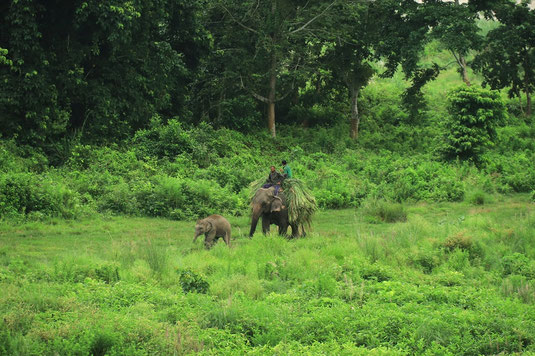
We then head into the jungle on foot with a guide. On the way, we see a tour group from another lodge being loaded onto the backs of elephants for a ride.
What seems like a romantic excursion has a dark background that should touch the heart of every empathetic person: For elephants to be ridden, the humans must first break their will. The baby elephants are separated from their mothers when they are only two or three years old and still children. They then cry for weeks after the forced separation. Often Mahouts or similar tools are used to train them—sharp metal hooks which are used to beat the animals and prick their most sensitive body parts. The still baby elephants have their feet chained so that they cannot return to their mothers. When the ordeal is over, the mother-child pairs frequently no longer recognize each other.
Imagine a small child you know. Your own children, the neighbor's child, children of friends and relatives, grandchildren. Can you imagine that a (self-proclaimed) superior species would do this to children just to turn them into a tourist attraction?
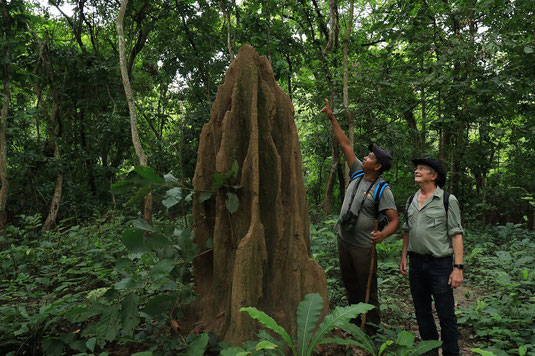
We purposely booked this tour with Welcome Nepal Treks because they stopped the elephant rides. As we walk along the trail, our guide points to the tour group that is about to climb onto the elephants' backs and tells us, "We used to do something like that, but then Europeans in particular told us how cruel it was and that they were against it and they no longer wanted to book the elephant rides. As a result, we took the riding out of our program."
I am surprised. People often think that a complaint, an expression of opinion, a review on the Internet won't achieve anything anyway.
It did here. My boyfriend and I, as well as the three Scandinavians walking with us, endorse the tour operator's decision and praise the rethink.
Bottom line: Say something. A single vote is better than none. Maybe one day no little elephant will have to suffer because of something you have said. Because your opinion has made someone think.
Overnight stay in the jungle—hot sweat
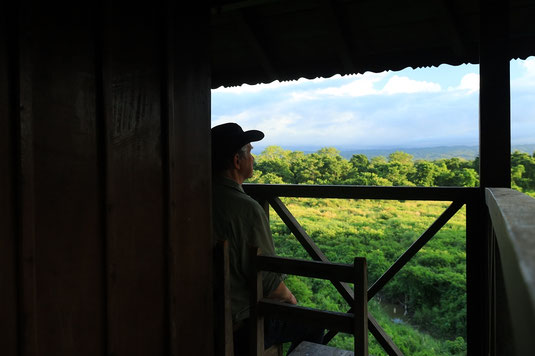
We spend one of the nights in the Chitwan National Park sleeping in a three-story wooden tower in the middle of the forest. There's a bed with a mosquito net, a toilet utilizing rainwater, and an awesome view.
From the balcony on the top floor, we look out over dense, green bushes on the ground, a plain of African-looking trees and listen to a fabulous concert of cicadas, monkeys, and frogs. There is no air conditioning. I throw my hiking boots in the corner and wipe my wet arms with my wet palms. It's as hot as if my head were stuck in an oven while at the same time I seem to drown in a fountain of sweat. Everything is sticky. Only the jungle is this disgusting and beautiful at the same time. I try to think back to our winter trip to northern Alaska a few months before. When I dropped my glove on the ground and my hand went numb from the icy wind during the three seconds it took to pick it up again. The idea is completely absurd.
Rhinos at night
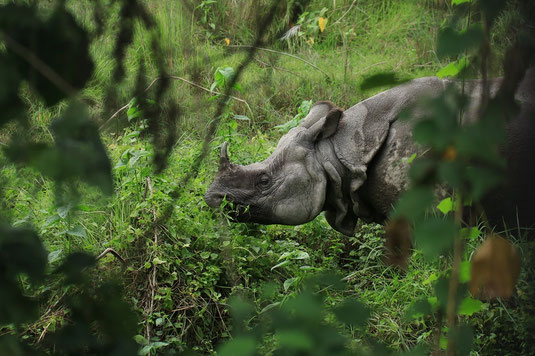
But hey, maybe we'll see a tiger. Illegal hunting of tigers had unfortunately led to a sharp decline in the tiger population. Chitwan National Park was established in 1973, in part to protect the tigers. Since then, their population has been able to recover. Nevertheless, seeing a tiger is a very rare event, and unfortunately, we have no luck during our night in the jungle.
But around sunset, there is a sudden rustling and snorting in the dense bushes below us. Although we didn’t see them coming, several fat, gray rhinos suddenly emerge through the leaves below us! They stop majestically, look around, chew, and snort again. We sit quietly atop our wooden tower and peer down. It is wonderful! White clouds and bluish evening light spread across the plain. A few deer appear. It's like a play. The cicadas unpack their violins and somewhere a bird calls in time.
Then the rhinos slowly and peacefully pass the herd of deer and disappear back into the foliage.
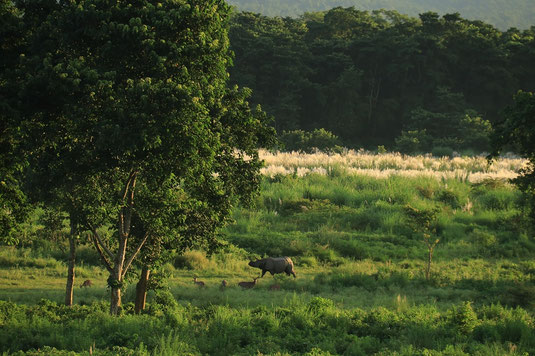
Of course, I have to go to the loo at 3 a.m., which is one floor below. I grab my flashlight because the night is completely dark other than a little moonlight. No streetlights, no cars, no houses. But there are a multitude of bugs that are all out to get me. Dude, can't they just go to sleep?
I hear a snort down below. I point my flashlight into the jungle. One of the rhinos looks up at me. Almost as if it's saying "Hey, turn off the light!" I laugh and switch the torch off again.
A trip to Chitwan National Park is a journey to a part of Nepal that has nothing to do with snow
and mountaineering. A place where animal protection is "in the making", where you can see the commitment of the people to conservation, and where you can play a small part in
improving the situation for nature there with your decisions and your words—not in a patronizing Western way, but with an educating discussion.
Click here for our other adventures on our bus trip through Nepal:





